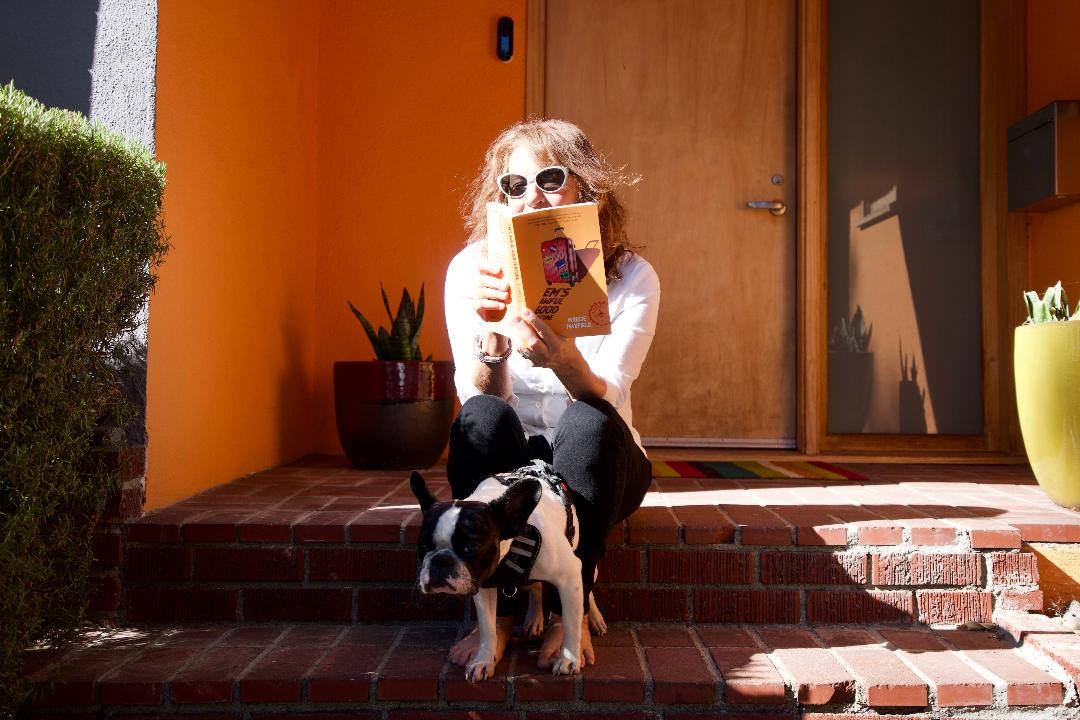
Marcie’s debut novel, Em’s Awful Good Fortune tackles the thorny issue of how to balance career and marriage as a tagalong spouse. It springs between the USA, Korea, Paris, Tokyo, Shanghai in a quest to discover her place in the world. Join us as we discuss expat life, feminism, finding your voice, and more.
Tell us a bit about your life before you moved abroad.
My first jobs were in marketing and promotion with Sony Music, ABC Radio and BAM—a California rock magazine. I studied liberal arts at the University of Michigan and then received a business degree from Wayne State University in Detroit. The truth is, I wasn’t really interested in business, but I was fascinated by the music industry!
After we moved to Korea, I never got back into the music industry. In hindsight, my career path was probably going to change direction anyway—it was a seven-day-a-week gig that involved going to clubs every night! Not exactly a good fit with being a mother. Still, I loved that part of my life and gave it up to go to Korea for my husband’s job. That didn’t sit easily with me. It wasn’t until I became serious about writing that I made peace with my choices.
I’ve heard you refer to Em’s Awful Good Fortune as autofiction. What does this mean?
Em’s story has the authenticity of memoir, but it’s also highly embellished, incorporating the literary licence of fiction. Em is a character—she’s my alter ego—unleashed and unfiltered.
I started writing this book as memoir, based on my experience living in China. At the time, the book was called The Tagalong Wife. It was centred around expat wives, no husbands allowed in the story. My original concept was that environmental issues like pollution would be the antagonist, but as I got deeper into the writing, I realized there was no relationship drama or conflict. At the time, my marriage was in a great place—so I created Em.
Em has VOICE, all caps. How did you develop her distinctive style?
Em expresses things I’ve thought but wouldn’t say out loud. I gave her free rein. Whenever the story strayed from that voice, I’d step away from computer and write in pencil, basically stream of consciousness, until her voice emerged on the page.
Junot Díaz was my style muse. I discovered his work while teaching writing to youth in detention. The kids could totally relate to his style, he’s from the Dominican Republic and moves fluidly, exquisitely, between Spanish, English, and street language. He’s also a Pulitzer prize-winning author. His book This is How You Lose Her sat on my desk, dog-eared. Sometimes, when I lost my way, I’d stop and read a page of his work out loud. And then I’d let Em loose on the page.

How does your husband feel about the book? Does he want right of reply?
Ha! My husband is one of my biggest supporters. He has a theatre background and understands the need for dramatic license. He never confirms what is true or what was embellished. That’s not a question I answer either. My goal was not to adhere to the facts, but to find the emotional truth of this story.
That said, my husband wasn’t always this evolved. In the early years, he put his career before mine and it hurt our marriage.
Recently, with the advent of ‘diversity and inclusion’ goals, he’s had an awakening about society’s default to the patriarchy. He’s very proud of a trainee program he developed to bring women and people of color forward in his organization. When he comes home all excited about this program, I smile knowingly. Em would say, It’s about time, buddy.
Can you please share the blurb for Em’s Awful Good Fortune?
 Part dysfunctional marriage, part global romp, this is not your typical expat story. Instead, Marcie Maxfield pulls back the curtain on the globe-trotting world of a tagalong wife to explore issues of marriage and compromise. Moving backward and forward—both in time and between countries—Em’s Awful Good Fortune is woven together thematically by bits and pieces of Em’s life: love, loss, and betrayal. She stomps her way around the world coming to terms with the fantasy of having it all: husband, kids, and a career. Em is not just married; it’s more like being handcuffed to her husband’s international career. Sure, her life reads like a fantasy, bouncing between Los Angeles, Paris, Tokyo, Shanghai, and Seoul. But—the good fortune is all her husband’s: Em is just the tagalong wife. A voice-driven narrative that is raw, comic, and authentic, this is, true to life, a disorderly journey—one that ultimately arrives at a new understanding of self-love and the complexity of relationships.
Part dysfunctional marriage, part global romp, this is not your typical expat story. Instead, Marcie Maxfield pulls back the curtain on the globe-trotting world of a tagalong wife to explore issues of marriage and compromise. Moving backward and forward—both in time and between countries—Em’s Awful Good Fortune is woven together thematically by bits and pieces of Em’s life: love, loss, and betrayal. She stomps her way around the world coming to terms with the fantasy of having it all: husband, kids, and a career. Em is not just married; it’s more like being handcuffed to her husband’s international career. Sure, her life reads like a fantasy, bouncing between Los Angeles, Paris, Tokyo, Shanghai, and Seoul. But—the good fortune is all her husband’s: Em is just the tagalong wife. A voice-driven narrative that is raw, comic, and authentic, this is, true to life, a disorderly journey—one that ultimately arrives at a new understanding of self-love and the complexity of relationships.
As an expat spouse, I worried that my choice to leave my job made me less of a feminist. How do you reconcile this issue?
That’s a central them in Em’s Awful Good Fortune—how and why would a strong-willed woman give up her career for marriage? If I answer truthfully, during those early years, I sort of identified as an anti-feminist—because I couldn’t make my career and my marriage work, both, at the same time. The travel and adventure weren’t enough to satisfy me. Nor was being a stay-at-home parent. I became a bit resentful. It wasn’t until I leaned into writing that I felt good about my life.
When I started to write about a being a tagalong wife, I realized that I wasn’t comfortable telling this story without exploring the lifestyle from a feminist perspective. Why did I make these choices, and how does my story connect with women’s issues? The book analyses these decisions through the lens of male-female relationships.
To me, Michele Obama is the ultimate tagalong wife and feminist. In her book, Becoming, she talks about the loss of career and community when she gave up her legal practice in Chicago to support her husband’s political career in Washington. She describes throwing a birthday party for one of her daughters where the only guests at the party were security guards and staff because the kids had no friends. She speaks about having to be adaptable and hints at the threat of infidelity if one chooses not to move with their spouse. It became apparent to me that she, too, was a tagalong wife—these are the same issues expat spouses face. She had to completely reimagine her life and then she became more than a Chicago lawyer—she became a global icon. In a way, Becoming is a modern fairy tale. Of course, I am not the former First Lady, I do not have a global reputation to uphold, so Em’s Awful Good Fortune is a raw, badass accounting of one woman’s struggle to reimagine herself and learn to thrive.
Do you equate feminism with career?
Not at all. It’s about finding your own bliss, not losing sight of what it is that fulfills you. I struggled with giving up my career to keep our marriage together. Work had been a big part of my identity and a huge source of personal satisfaction—without it I was lost. And, by lost, I mean depressed and resentful. I wasn’t happy as a tagalong wife until I redefined myself as a writer and committed to the process of becoming one. I only wish I had figured that out sooner.
One of the questions I’m often asked is: why didn’t Em just leave her husband? I think of marriage as a choice—not just to get married but to stay married. The challenge is how to manage the changes that life throws at a couple. Especially in an expat partnership.
Is this book only relevant to expats?
Em’s story definitely resonates with expats. In the book, Em mentions that tagalongs never ask each other: Why do you do it? Quit your job, move overseas, follow your husband’s career. They intuitively understand these decisions. For others, this is harder to reconcile. But this book is not for expats only. The problems of career versus family, dual careers, and competing career goals are universal. Expat life is just an exaggerated situation—and Em is an extreme through which I explore this dilemma.
Would you go back on the road?
Funny you should ask! Once again, I’m faced with this decision. My husband is going back to Shanghai in a few months. But, due to Covid, it’s difficult for me to secure a spousal visa. The expat experience has changed dramatically. Traveling, in general, is more complicated than it used to be—there’s a two-week quarantine in a Chinese hotel plus an additional week required by his company. And, once you get there, you’re landlocked. All of that said, yes! I would go back to China if I could get a visa. But for now, my plan is to stay in Los Angeles.
What’s next?
I hate to talk about that because I don’t want to jinx it. I will say this: as much as I loved writing the character Em, my next book will not be in her voice. I don’t want to pigeonhole myself. That said, I’m delighted to bring Em to zoom book club appearances and readings.
You can follow Marcie on:
Email: msmaxfield@gmail.com
Website: www.marciemaxfield.com
Facebook: Marcie Maxfield, Author
Insta: @marcie.b.max
Twitter: @marciemaxfield
Link to the book: Australian Amazon
Next time: Annabel Kantaria on The House of Whispers, her fifth domestic noir novel.

2 thoughts on “Marcie Maxfield on Identity and the Expat Spouse”